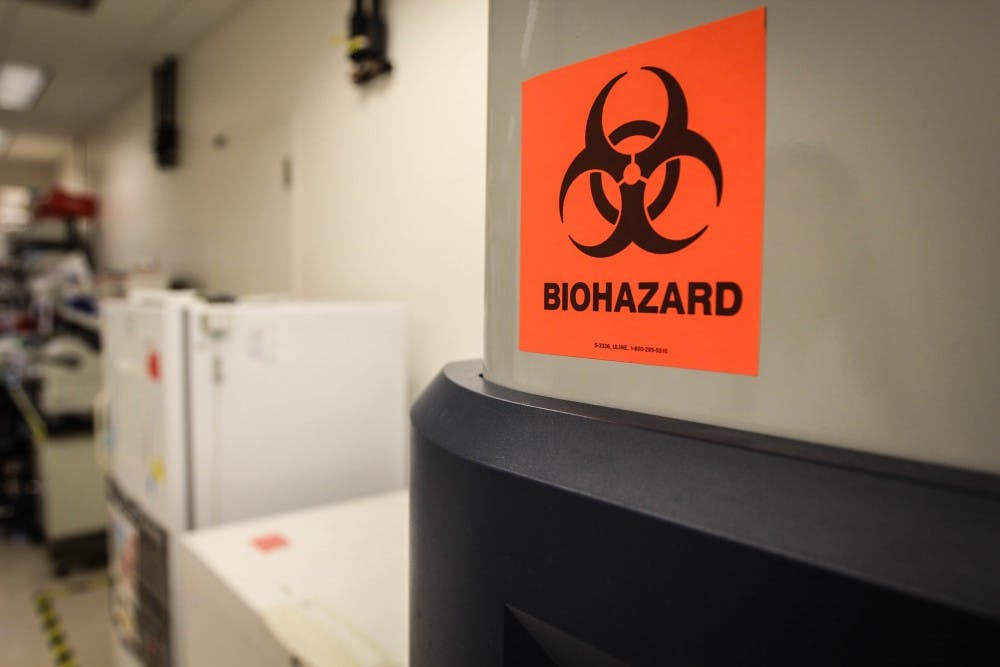 ASU Graduate student Xiaowei Liu peers into a microscope at ASU’s Bio Design laboratory. Liu is working on a vaccine to help people deal with nicotine addiction by optimizing a preliminary vaccine that has been developed. (Photo by Dominic Valente.)
ASU Graduate student Xiaowei Liu peers into a microscope at ASU’s Bio Design laboratory. Liu is working on a vaccine to help people deal with nicotine addiction by optimizing a preliminary vaccine that has been developed. (Photo by Dominic Valente.)Whether it be nicotine patches, e-cigarettes or the dreaded cold turkey approach, smokers have always been looking for a solution to their nicotine dependence, and researchers at ASU may be close to finding it.
Immunologist Yung Chang and a team of scientists and researchers at the Biodesign Institute are working on a project that involves using a DNA vaccine to combat nicotine dependence in a progressive new way.
The project, which is partially funded by a $3 million grant from the National Institute of Drug Abuse, could provide a groundbreaking solution for nicotine dependence if it is successful.
"Nicotine vaccines can be a very effective treatment for dependence," Chang said. "Several vaccines have been in clinical trials, but unfortunately, the current candidates have failed because their efficacy was not ideal."
Chang said the team's novel approach uses DNA as scaffolding material to synthetically assemble antigen components and enhance the vaccine receiver's immunity to nicotine dependence.
She said DNA is ideal because it is double helix and has a very precise base pair coding, which allows researchers to incorporate the molecule of interest, in this case the nicotine antigen, into the DNA quite easily and accurately.
"This is a completely new, bottom-up approach in which the National Institute of Health is interested," she said.
Chang said the research began in April and is still in its early stages, but the early data seems promising, and she is hopeful that in the next few years the team will be able to test on animal models and eventually begin clinical trials.
"We hope within the three-year funding period that we will have a candidate identified as the best candidate to induce immune response better than the current vaccine," she said. "There is still a lot that we need to work out, and we can't promise what we are going to get, but that is our hope."
She said safety is a main issue that the team is working on and that making sure the vaccine does not cause any adverse affects in the body will be tested rigorously and is top priority.
 A biohazard sign marks the front of a refrigerator. According to Xiaowei Liu, a team member on a research team at ASU, the refrigerator as been known to handle dangerous cultures of cells and bacteria. (Photo by Dominic Valente)
A biohazard sign marks the front of a refrigerator. According to Xiaowei Liu, a team member on a research team at ASU, the refrigerator as been known to handle dangerous cultures of cells and bacteria. (Photo by Dominic Valente)Once finalized, the vaccine would be as easy to get as a flu vaccine and would come in a shot, Chang said.
She said the targeted population for the vaccine is people who smoke heavily because they "need the most help," but eventually, the vaccine could conceivably be useful for people exposed to second-hand smoke.
Nearly one in five American adults smoke tobacco, according to the American Cancer Society and cigarette smoking causes more than 443,000 fatalities per year, according to the Center for Disease Control.
Economics and political science senior Abdullah Ahmed said he has been smoking cigarettes for more than four years. He said he smokes about one pack a day and has not been able to quit.
"I tried cold turkey a couple of times and sunflower seeds once, but the longest I lasted was a week," he said. "It was just way too hard."
Ahmed said he has gotten used to the smell and the stigma that haunts many smokers, but the cost —– more than $50 a week for him —– and his health, make the vaccine an ideal option for him.
He said he finds the idea of a nicotine vaccine interesting and would definitely try it once it is developed and available for public consumption.
"The effect that it has on my throat and lungs and the way it makes food taste is pretty worrisome to me," he said. "It's crazy that they are working on a vaccine, but I am definitely looking forward to technology like that which would make it easier to quit smoking."
Alumnus Matt Jacobs said he thinks the vaccine is an excellent idea, even though he only smokes when he is bored to kill time and does not find his cigarette smoking "out of control."
"I think a lot of people would benefit from that, especially those who are super addicted to smoking," he said. "For people who do it more consciously, it's probably more of a matter of will power, and I'm not sure vaccination will address that."
Reach the reporter at npmendo@asu.edu or follow him on Twitter @NPMendoza




